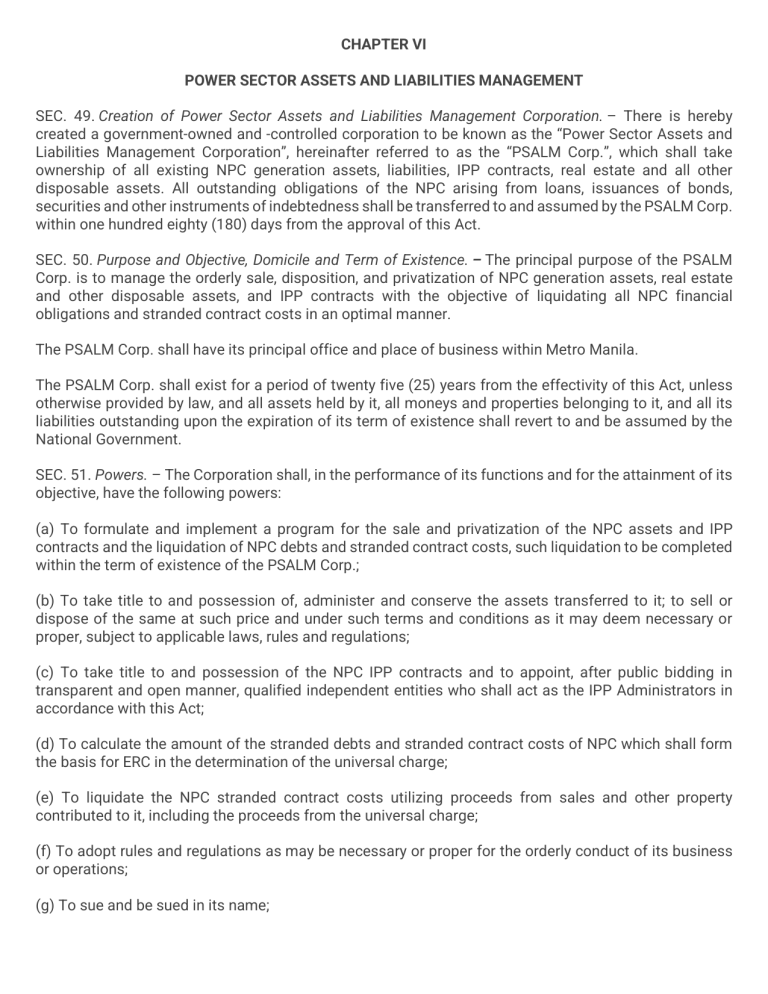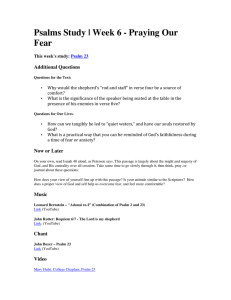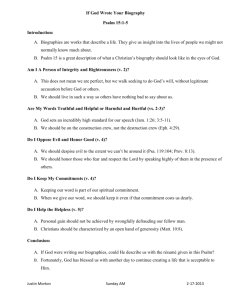
CHAPTER VI POWER SECTOR ASSETS AND LIABILITIES MANAGEMENT SEC. 49. Creation of Power Sector Assets and Liabilities Management Corporation. – There is hereby created a government-owned and -controlled corporation to be known as the “Power Sector Assets and Liabilities Management Corporation”, hereinafter referred to as the “PSALM Corp.”, which shall take ownership of all existing NPC generation assets, liabilities, IPP contracts, real estate and all other disposable assets. All outstanding obligations of the NPC arising from loans, issuances of bonds, securities and other instruments of indebtedness shall be transferred to and assumed by the PSALM Corp. within one hundred eighty (180) days from the approval of this Act. SEC. 50. Purpose and Objective, Domicile and Term of Existence. – The principal purpose of the PSALM Corp. is to manage the orderly sale, disposition, and privatization of NPC generation assets, real estate and other disposable assets, and IPP contracts with the objective of liquidating all NPC financial obligations and stranded contract costs in an optimal manner. The PSALM Corp. shall have its principal office and place of business within Metro Manila. The PSALM Corp. shall exist for a period of twenty five (25) years from the effectivity of this Act, unless otherwise provided by law, and all assets held by it, all moneys and properties belonging to it, and all its liabilities outstanding upon the expiration of its term of existence shall revert to and be assumed by the National Government. SEC. 51. Powers. – The Corporation shall, in the performance of its functions and for the attainment of its objective, have the following powers: (a) To formulate and implement a program for the sale and privatization of the NPC assets and IPP contracts and the liquidation of NPC debts and stranded contract costs, such liquidation to be completed within the term of existence of the PSALM Corp.; (b) To take title to and possession of, administer and conserve the assets transferred to it; to sell or dispose of the same at such price and under such terms and conditions as it may deem necessary or proper, subject to applicable laws, rules and regulations; (c) To take title to and possession of the NPC IPP contracts and to appoint, after public bidding in transparent and open manner, qualified independent entities who shall act as the IPP Administrators in accordance with this Act; (d) To calculate the amount of the stranded debts and stranded contract costs of NPC which shall form the basis for ERC in the determination of the universal charge; (e) To liquidate the NPC stranded contract costs utilizing proceeds from sales and other property contributed to it, including the proceeds from the universal charge; (f) To adopt rules and regulations as may be necessary or proper for the orderly conduct of its business or operations; (g) To sue and be sued in its name; (h) To appoint or hire, transfer, remove and fix the compensation of its personnel: Provided, however, That the Corporation shall hire its own personnel only if absolutely necessary, and as far as practicable, shall avail itself of the services of personnel detailed from other government agencies; (i) To own, hold, acquire, or lease real and personal properties as may be necessary or required in the discharge of its functions; (j) To borrow money and incur such liabilities, including the issuance of bonds, securities or other evidences of indebtedness utilizing its assets as collateral and/or through the guarantees of the National Government: Provided, however, That all such debts or borrowings shall have been paid off before the end of its corporate life; (k) To restructure existing loans of NPC; (l) To collect, administer, and apply NPC’s portion of the universal charge; and (m) To restructure the sale, privatization or disposition of NPC assets and IPP contracts and/or their energy output based on such terms and conditions which shall optimize the value and sale prices of said assets. SEC. 52. Power Sector Assets and Liabilities Management Corporation, Meetings, Quorum and Voting. – The Corporation shall be administered, and its powers and functions exercised, by a Board of Directors which shall be composed of the Secretary of Finance as the Chairman, the Secretary of Budget and Management, the Secretary of the Department of Energy, the Director-General of the National Economic and Development Authority, the Secretary of the Department of Justice, the Secretary of the Department of Trade and Industry and the President of the PSALM Corp. as ex officio members thereof. The Board of Directors shall meet regularly and as frequently as may be necessary to enable it to discharge its functions and responsibilities. The presence at a meeting of four (4) members shall constitute a quorum, and the decision of the majority of three (3) members present at a meeting where there is quorum shall be the decision of the Board of Directors. SEC. 53. Powers of the President of PSALM Corp. – The President of PSALM Corp. shall be appointed by the President of the Philippines. In the absence of the Chairman, the President shall preside over Board meetings. The PSALM Corp. President shall be the Chief Executive Officer of PSALM Corp. and shall have the following powers and duties: (a) To execute and administer the policies and measures approved by the Board, and take responsibility for the efficient discharge of management functions; (b) To oversee the preparation of the budget of PSALM Corp.; (c) To direct and supervise the operation and internal administration of PSALM Corp. and, for this purpose, may delegate some or any of his administrative responsibilities and duties to other officers of PSALM Corp; (d) Subject to the guidelines and policies set up by the Board, to appoint and fix the number and compensation of subordinate officials and employees of PSALM Corp; and for cause, to remove, suspend, or otherwise discipline any subordinate employee of PSALM Corp; (e) To submit an annual report to the Board on the activities and achievements of PSALM Corp. at the close of each fiscal year and upon approval thereof, submit a copy to the President of the Philippines and to such other agencies as may be required by law; (f) To represent PSALM Corp. in all dealings and transactions with other offices, agencies, and instrumentalities of the Government and with all persons and other entities, private or public, domestic or foreign; and (g) To exercise such other powers and duties as may be vested in him by the Board from time to time. SEC. 54. Exemption from the Salary Standardization Law. – The salaries and benefits of employees in the PSALM Corp. shall be exempt from Republic Act No. 6758 and shall be fixed by the PSALM Corp. Board. SEC. 55. Property of the PSALM Corp. – The following funds, assets, contributions and other property shall constitute the property of the PSALM Corp.: (a) The generation assets, real estate, IPP contracts, other disposable assets of NPC, proceeds from the sale or disposition of such assets and the residual assets from B-O-T, R-O-T, and other variations thereof; (b) Transfers from the National Government; (c) Proceeds from loans incurred to restructure or refinance NPC’s transferred liabilities: Provided, however, That all borrowings shall be fully paid for by the end of the life of the PSALM Corp.; (d) Proceeds from the universal charge allocated for stranded contract costs and the stranded debts of NPC; (e) Net profit of NPC; (f) Net profit of TRANSCO; (g) Official assistance, grants, and donations from external sources; and (h) Other sources of funds as may be determined by PSALM Corp. necessary for the above-mentioned purposes. SEC. 56. Claims Against the PSALM Corp. – The following shall constitute the claims against the PSALM Corp.: (a) NPC liabilities transferred to the PSALM Corp.; (b) Transfers from the national government; (c) New loans; and (d) NPC stranded contract costs. Introduction: The creation of the Power Sector Assets and Liabilities Management Corporation (PSALM Corp.) was mandated by a government Act to address the management and privatization of assets, liabilities, and contracts of the National Power Corporation (NPC). This report outlines the key provisions, objectives, powers, governance structure, and financial aspects of the PSALM Corp. as stipulated in the Act. Creation and Purpose: The PSALM Corp. is a government-owned and -controlled corporation established to manage NPC generation assets, liabilities, Independent Power Producer (IPP) contracts, real estate, and other disposable assets. Its primary purpose is to facilitate the orderly sale, disposition, and privatization of NPC assets and IPP contracts with the objective of liquidating all NPC financial obligations and stranded contract costs optimally. Duration and Governance: The PSALM Corp. is mandated to exist for a period of twenty-five (25) years from the effective date of the Act, unless otherwise provided by law. The Corporation is governed by a Board of Directors chaired by the Secretary of Finance and composed of key government officials the Secretary of Budget and Management, the Secretary of the Department of Energy the Director-General of the National Economic and Development Authority the Secretary of the Department of Justice the Secretary of the Department of Trade and Industry and the President of the PSALM Corp. as ex officio members. The President of the PSALM Corp. is appointed by the President of the Philippines and acts as the Chief Executive Officer, responsible for implementing Board-approved policies and managing day-to-day operations. Powers and Responsibilities: The PSALM Corp has the power to: 1. Formulate and implement programs: PSALM Corp. can design and execute plans for selling/privatizing NPC assets, IPP contracts, and liquidating NPC debts within its lifespan. 2. Manage and sell assets: They can take ownership, administer, conserve, and sell NPC assets (real estate, etc.) under appropriate terms and conditions. 3. Manage IPP contracts: PSALM Corp. can take control of NPC's IPP contracts and appoint independent administrators through transparent bidding. 4. Calculate stranded costs: They are responsible for calculating the NPC's stranded contract costs, which are used to determine the universal charge for electricity. 5. Liquidate stranded costs: PSALM Corp. can utilize proceeds from asset sales and the universal charge to settle NPC's stranded contract costs. 6. Adopt regulations: They have the authority to create rules and regulations for their business operations and conduct. 7. Sue and be sued: PSALM Corp. can engage in legal proceedings under its own name. 8. Manage personnel: They can appoint/hire, transfer, remove, and determine the compensation of their personnel, with limitations on direct hiring. 9. Own and acquire properties: PSALM Corp. can buy, hold, or lease real and personal properties needed for their functions. 10. Borrow money and issue debt: They can borrow funds and issue bonds/securities using their assets or government guarantees, with the requirement to repay all debts before their term ends. 11. Restructure NPC loans: PSALM Corp. has the authority to restructure existing loans taken by the National Power Corporation. 12. Collect universal charge portion: They are responsible for collecting the NPC's designated share of the universal charge, a fee levied on electricity consumers. 13. Restructure sales/privatization: PSALM Corp. can adjust the terms and conditions of NPC asset and IPP contract sales/privatization to optimize their value and sale price. The President of the PSALM Corp. is delegated specific powers and duties including: • Execution and Administration of Policies Responsibility for Efficient Management Budget Preparation Supervision of Operations and Internal Administration Delegation of Administrative Responsibilities Staff Management Reporting and Representation Financial Provisions: Salaries and benefits of PSALM Corp. employees are exempt from the Salary Standardization Law (Republic Act No. 6758) and are determined by the PSALM Corp. Board. The Corporation's property includes NPC assets, real estate, IPP contracts, proceeds from asset sales, transfers from the National Government, loan proceeds, universal charge proceeds, net profits of NPC and TRANSCO, external grants, and other funding sources. Claims Against PSALM Corp.: Claims against the PSALM Corp. include NPC liabilities, transfers from the National Government, new loans, and NPC stranded contract costs. Conclusion: The establishment of the PSALM Corp. signifies a strategic move towards the privatization and efficient management of NPC assets and liabilities. Its structured governance, defined powers, and financial provisions aim to ensure optimal liquidation of NPC financial obligations within the specified timeframe while safeguarding the interests of stakeholders involved.





